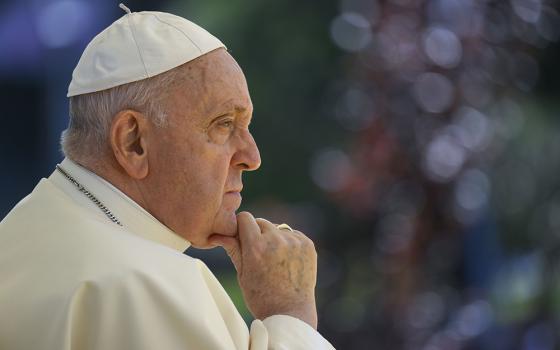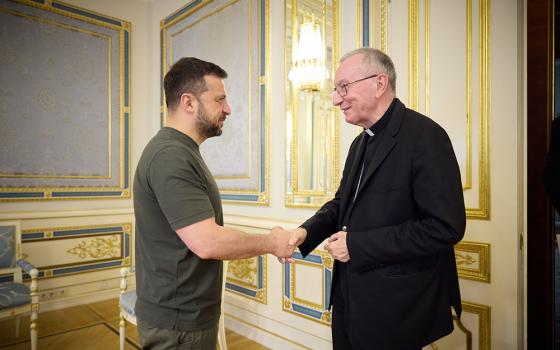Samuel Gregg, Research Director at the Acton Institute, has decided to cast aspersions upon the consistent ethic of life, articulated most famously by the late Cardinal Joseph Bernardin and re-proposed in recent weeks by +Bernardin’s successor, Archbishop Blase Cupich. Gregg’s essay warrants a reply.
Gregg aims to expose what he terms “significant ambiguities that characterized important aspects of the seamless garment’s theological and philosophical apparatus.” He acknowledges that “there has always been an inner consistency to Catholic moral teaching,” which was the point +Bernardin was attempting to make, but then shifts the discussion without acknowledging it, writing, “This [consistency] emanates from the truth that Divine Revelation (and the God from whom it proceeds) cannot contradict itself. On another level, the stability also proceeds from the Church’s long-standing teaching that there are certain acts which may never be done.” Stability and consistency often go hand-in-hand, but they are not the same thing. The shift permits him to introduce the concept of intrinsic evil, “certain acts which may never be done.”
Gregg seems to conflate “exceptionless moral norms” with “intrinsic evil.” There are positive moral norms, such as the duty to act justly, that also do not admit exceptions. Perhaps he is confused. In any event, the key mistake is thinking that because an act is intrinsically evil, it should be legally proscribed. There is a moral analysis appropriate to the acts of individuals and a different moral analysis appropriate to public policy, especially in a pluralistic democracy like our own. By way of example, lying is intrinsically evil, it is an act that can never be done, and it redounds always upon the perpetrator, which is another, better way of thinking about the category of intrinsic evil. Yet, in terms of criminal law, we only prosecute lying when it is used to frustrate a contract, and becomes fraud, or to frustrate the judicial system, and becomes perjury. If Mrs. Gregg comes home tonight wearing the ugliest dress known to the history of dress-making, and she asks Mr. Gregg how it looks, he is well within his legal rights, to say nothing of common sense, to tell her the dress looks great. Masturbation is an intrinsic evil, too, and I could not find a position paper at the Acton Institute website about what the criminal statute would look like that dealt with that crime.
Gregg then turns to the related distinction between laws rooted in the “thou shalt nots” of the Decalogue and “the other side of the Christian moral life which is the doing of good as we seek to live out the supreme commandment of love of neighbor.” Here, Gregg makes the kind of mistake he and his colleagues at Acton frequently make, introducing prudential judgment in contradistinction to moral reasoning. He writes, and I quote the two paragraphs at length so that the reader can grasp his argument as he states it:
Second, the Fordham lecture [delivered by +Bernardin] was insufficiently attentive to the point that most public policy issues involve choice not only between good and bad options but also between many good options. Some of these good possibilities, to cite the moral theologian Germain Grisez, may be “incompatible with one another but compatible with the Church’s teaching.” In many cases, when a good quality of life posture is identified—such as universal health cover [sic]—the discernment of how a community attains that end may depend upon empirical and prudential judgements reasonably in dispute among people equally well-informed by principles of Catholic teaching.
Having considered the vast amount of data and other obtainable evidence about the nature, costs, and benefits of various proposals and informed themselves of the principles of Catholic teaching, some Catholics may determine that universal healthcare is best realized by a predominantly state-funded system. Other Catholics, having examined the same mass of evidence and informed themselves of the same principles, may conclude that private health-insurance, underpinned by a government safety net, is the most prudential approach. But whatever conclusions are reached, one would expect Catholics reflecting upon this subject to recognize that there are many policies that people can support to realize such a goal while remaining in good standing with the Church.
It is true that “many policies” may exist which a Catholic can support, all of which achieve the moral principle that human persons have a right to basic health care. But, many is not all, and among the many, some may be preferable, on moral grounds, to others. Gregg seems to think that moral analysis is completed once one has articulated a principle, and then it is all a matter of prudential judgment, but prudential judgment is itself an exercise in moral reasoning. The morality goes all the way down from the principle to the concrete decision. Creating an abyss between moral judgment and prudential judgment has been a pet project of a certain kind of conservative Catholic social commentator, because the think prudential judgment amounts to a get-out-of-jail-free card, allowing them to ignore the moral significance of, for example, cutting food stamps.
Likewise, even if we agree that something is both intrinsically evil and fit for legal proscription, there is still a role for prudential judgment. All Catholics must believe that abortion is an intrinsic evil. If we also believe, as I think we must, that abortion is a grave evil, an act of injustice and inhumanity that makes it fit for legal proscription, we still have some prudential judgments to make. Should we use the criminal or the civil law to address the issue? If we use the criminal law, does it aim at the woman who procures an abortion or the doctor who performs it? What is the penalty? Does a doctor go to jail or simply lose his license? And, most importantly, what steps would be taken to support women facing a crisis pregnancy so that they would not have recourse to a dangerous illegal abortion? The distinction between issues that entail an intrinsic evil and those that require prudential judgment is a false distinction. Period.
Gregg is specifically upset when bishops engage in the exercise of policy advocacy and analysis that he thinks should be left to the laity, precisely because such judgments require expertise and prudential judgments. In the event, most of the bishops I know are quite prudent, but we can have that discussion another day. Gregg writes:
Catholic bishops, priests, and religious are not required to remain silent about prudential policy-issues. They don’t cease to be citizens by virtue of ordination. But the Council’s underscoring of the laity’s primacy in shaping the temporal order casts doubt upon Cardinal Bernardin’s claim in a 1985 Catholic University of America lecture that Catholic bishops, as part of promoting the consistent ethic, should offer “policy conclusions” “to stimulate the public argument” and “give a sense of how the moral principles take shape in the concrete situations our society faces.”
Certainly, Cardinal Francis George, +Bernardin’s successor, defended the right of bishops to speak to the moral content and consequences of civil law when the bishops decided to oppose the Affordable Care Act. Did Gregg criticize Cardinal George on that? More importantly, as even Gregg acknowledges, the bishops stated in many pastoral letters that their moral certainty diminishes as they move from the principle to the concrete application of the principle, as it does for all of us. But, the lack of certainty is not the same thing as moral confusion or “anything-goes” because prudential judgment is required. In the application of a moral principle to a concrete situation, there are alternatives that show themselves to be inconsistent with a Catholic’s ethic of life.
There is one point that Mr. Gregg makes with which I wholeheartedly agree. There were people who used +Bernardin’s consistent ethic of life badly, in an attempt to provide cover to mostly Democratic politicians who were pro-choice. There are those today who still use it so. But, the answer is not to craft alternate moral analyses that give Republican politicians a pass on issues related to poverty or the treatment of immigrants. The answer is for Catholics to be Catholic first in the public square, and for the bishops to make sure that they avoid any semblance of partisanship in their public stance. The policy concerns that the Church brings to the public square are rooted in transcendent concerns, and nothing so robs them of that unique status – and appeal – than to find their champions in the hierarchy shamefully shilling for one party or the other. There may come a time when one party more obviously reflects the values that animate the Catholic moral vision, but both parties do such a lousy job of reflecting any moral vision at the moment, it is hard to imagine us facing this conundrum anytime soon. As I noted in 2012, when news broke that Cardinal Dolan would be giving a prayer at both political conventions, he could merely recite the Lord’s Prayer because both parties, as presently constructed, should choke on the words “Thy Will de done.”
His Will is no mere principle. It demands application. A Catholic moral analysis cannot stop with the articulation of principles. Prudential judgment is required to apply moral principles, but prudential judgment, so far from being devoid of moral content, is itself an exercise in moral analysis, all the way down to the selection among policy alternatives. When Mr. Gregg et al. realize this, there is a discussion to be had. In the meantime, he is merely providing cover for politicians he likes. Attacking the legacy of the late Cardinal Bernardin, who was a giant, is unhelpful at best. And, attacking the current incumbent in Chicago is a fool’s errand.




